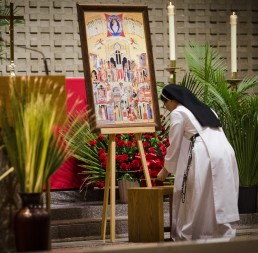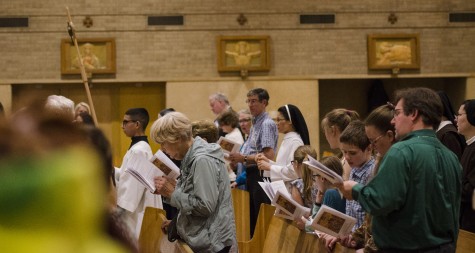April 11, 2017 // Local
Palm Sunday Prayer for the Martyrs

Sister Anh Thi Kim Tran, OP, places a palm in front of the Icon of the Martyrs at St. Matthew Cathedral April 9.
By Jennifer Miller
On Palm Sunday evening, the Community of Sant’Egidio and Bishop Kevin C. Rhoades led a Prayer for the Martyrs at St. Matthew Cathedral, South Bend. The powerful and moving service remembered martyrs of the current era who gave their lives for the Gospel. Connecting their sacrifice with that of Jesus’ on the cross, the prayer vigil was a striking way to begin Holy Week.
The sacred week began with Palm Sunday, Jesus’ announcement of the building of the kingdom of God through humility; continuing through the painful agony of His suffering on the cross; and ending with His ultimate victory over death, the glory of the Easter resurrection. The lives of the modern-day martyrs recall Christ’s Paschal Mystery, which they lived and experienced as His disciples.
Created and begun by St. John Paul II during the Jubilee Year of 2000, the Prayer for the Martyrs is unique in two ways. First, it is an accurate memory of specific Christians killed for their faith. Grouped by continent and region, each country where martyrs gave their lives is read aloud, name by name, with “Lord, have mercy” or “Kyrie Eleison,” in Greek, petitioned between each. Each martyr’s name, age, country of birth and life detail are briefly shared. These seemingly small but key details are vital in the living Tradition of the church.
The early church father Quintis Septimus Florens Tertullianus wrote that the blood of the martyrs is the seed of the church. He knew the names and stories of the hundreds killed in the church’s early years, persecuted by the Romans. He observed, too, the flourishing of the faith as a direct result of the martyrs’ witness. Thus the remembering of the specifics of each martyr follows in that great example.

From left, John Kurdelak, Dan Philpott, James Philpott, Angela Philpott, Samara Kelley, Maria Surat, Jon Schommer, Claire Fyrqvist and Lisa Anderson, who composed the choir of the Prayer for the Martyrs, lead the congregation in a response.
Secondly, the remembering the martyrs by name is theologically significant for Christians. Throughout the Bible, from Adam and Eve to Jesus’ own name, God calls individuals specifically and by name. Remembering their sacrifice for love of God by name reflects that same personal love that God called them into being. Listening to each name being read, country by country, is a powerful expression of the witness of the martyrs in the universal church. In his homily, Bishop Rhoades spoke of this testimony.
“The martyrs often faced unspeakable trials and sufferings, yet they refused to deny the Lord, to renounce the faith. … They give very tangible testimony to the strength of the human spirit, actually the power of the Holy Spirit acting in human souls,” he proclaimed. “It is the strength to carry the cross of Jesus, to follow the path of Jesus, to suffer with Him and for Him, in the firm hope of sharing in His resurrection.
“The martyrs teach us in the most vivid way what it means to live the Eucharist. Their bodies broken and their blood poured forth are an eloquent sign of the self-giving love, the sacrifice, of Jesus which we are privileged to share at the altar of the Lord.”
The bishop especially recognized the life and witness of Father Stanley Rother, who will be the first U.S.-born priest and first U.S.-born martyr to be beatified in the Catholic Church this September. Originally from Oklahoma City, he was a missionary to the Tzutuhil Indians, serving in Santiago Atitlan, Guatemala.
Bishop Rhoades’ words were especially poignant considering the world news on the morning of the prayer, which reported on deadly attacks made at Coptic Christian churches in Egypt.
“This morning in Egypt, two Coptic Christian churches were bombed and 44 innocent people and over 120 people wounded. They were at church to celebrate the Eucharist, Jesus’ sacrifice of love. Their bodies were broken and their blood was shed, like Jesus. Those who died died in Christ. Let us pray for them during this service, that they may rise with Christ to the glory of heaven. And let us ask Mary, Our Lady of Sorrows, to comfort those who mourn their death and to intercede for the Church, the Body of Christ, in Egypt and throughout the Middle East.
“These modern-day martyrs remind us that the Passion of Jesus is not just an event of the past. Members of His body, the church, are united with Him in His suffering and death,” Bishop Rhoades explained.

Those present offered prayers for the souls of martyrs around the world and for an end to the persecution of the faithful.
Meredith Anatolios, who attended the prayer with her two young daughters, echoed his words. “I was already planning on attending the Prayer for the Martyrs, but when I heard about the bombings in Egypt that very day, I felt it was even more important to attend. I think about those families in Egypt going to church knowing that they are risking their lives. I know I take our freedom to worship for granted, and I wanted to be there to pray for the Christians around the world who face such perilous times.”
Bishop Rhoades also spoke to the situation of the local faithful, and said that while many present may not be called to direct martyrdom, “…we are (all) called to holiness. And this entails taking up our daily cross. We can look to the martyrs for inspiration, especially when we are tempted to selfishness. … They remind us of our duty to grow every day in greater love for God and for our neighbor. They teach us that no matter how harsh the trial or how difficult the problems in our life, or how acute the suffering may be in our life, we are always in God’s hands, the hands that created us and sustain us and accompany us on our journey through life, our pilgrimage to heaven.”
The best news. Delivered to your inbox.
Subscribe to our mailing list today.





